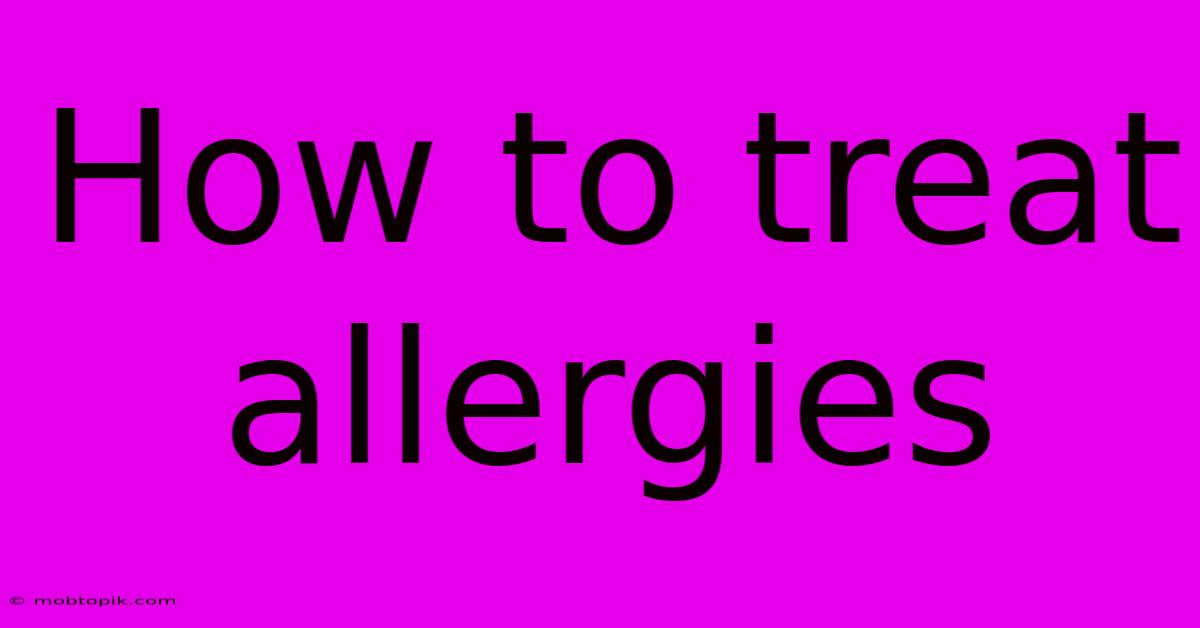How To Treat Allergies

Discover more detailed and exciting information on our website. Click the link below to start your adventure: Visit Best Website mobtopik.com. Don't miss out!
Table of Contents
How to Treat Allergies: A Comprehensive Guide
Allergies affect millions worldwide, causing a range of uncomfortable and sometimes debilitating symptoms. Understanding your allergies and employing the right treatment strategies is key to managing them effectively. This comprehensive guide explores various allergy treatments, from over-the-counter remedies to prescription medications and long-term management strategies.
Understanding Your Allergies
Before diving into treatment, it's crucial to identify your allergens. Common allergens include:
- Pollen: Tree, grass, and weed pollen are frequent culprits in seasonal allergies (hay fever).
- Pet dander: Tiny skin flakes from cats, dogs, and other animals.
- Dust mites: Microscopic creatures that thrive in bedding, carpets, and upholstery.
- Mold: A type of fungus found both indoors and outdoors.
- Food allergens: Common food allergens include peanuts, tree nuts, milk, eggs, soy, wheat, fish, and shellfish.
- Insect stings: Bee, wasp, and hornet stings can trigger severe allergic reactions.
Identifying your specific allergens is the first step in effective allergy management. This often involves visiting an allergist for allergy testing, such as skin prick tests or blood tests. These tests can pinpoint the exact substances triggering your allergic reactions.
Treating Allergic Symptoms: A Multi-pronged Approach
Allergy treatment is rarely a one-size-fits-all solution. The best approach often involves a combination of strategies tailored to your specific needs and the severity of your symptoms.
1. Over-the-Counter (OTC) Medications
For mild to moderate allergic symptoms, OTC medications can provide significant relief. These include:
-
Antihistamines: These medications block histamine, a chemical released by your body during an allergic reaction. They are available in various forms, including oral tablets, capsules, liquids, and nasal sprays. Examples include cetirizine (Zyrtec), fexofenadine (Allegra), and loratadine (Claritin). Choose a non-drowsy formula if you need to remain alert.
-
Decongestants: These medications help relieve nasal congestion by constricting blood vessels in the nasal passages. They're available as nasal sprays (like oxymetazoline) or oral medications (like pseudoephedrine). Be cautious with nasal sprays, as overuse can lead to rebound congestion.
-
Nasal Corticosteroids: These are available as nasal sprays and are highly effective in treating nasal inflammation and congestion associated with allergies. Examples include fluticasone (Flonase) and mometasone (Nasonex). They are generally safe for long-term use.
-
Eye Drops: Antihistamine and mast cell stabilizer eye drops can alleviate itchy, watery eyes.
2. Prescription Medications
If OTC medications aren't enough, your doctor may prescribe stronger medications:
-
Prescription Antihistamines: These are often stronger than OTC versions and can be effective for more severe symptoms.
-
Leukotriene Modifiers: These medications block the action of leukotrienes, chemicals involved in allergic inflammation. Examples include montelukast (Singulair) and zafirlukast (Accolate). They are often used for asthma and allergic rhinitis.
-
Immunotherapy (Allergy Shots): This is a long-term treatment that involves gradually increasing exposure to your allergens over time. It aims to desensitize your immune system, reducing your allergic response. Immunotherapy is particularly effective for those with severe allergies or those who haven't found relief with other treatments. It requires regular visits to an allergist.
3. Lifestyle Modifications and Avoidance Strategies
Avoiding allergens as much as possible is crucial for managing allergy symptoms. This involves:
-
Environmental Control: Reduce dust mites in your home by regularly washing bedding in hot water, using dust-mite-proof covers for mattresses and pillows, and regularly cleaning carpets and upholstery. Keep your home clean and well-ventilated to minimize mold growth.
-
Pet Management: If you're allergic to pets, consider keeping them out of bedrooms and frequently bathing them. Regularly cleaning surfaces they come into contact with is also beneficial.
-
Pollen Management: Stay indoors during high pollen counts, particularly in the early morning and late evening. Close windows and use air conditioning. Consider using a HEPA filter air purifier.
-
Dietary Changes: If you have food allergies, carefully read food labels and avoid foods containing your allergens. Always carry an epinephrine auto-injector (like an EpiPen) if you have a severe food allergy.
4. Treating Allergic Reactions
Severe allergic reactions, known as anaphylaxis, are life-threatening and require immediate medical attention. Symptoms can include difficulty breathing, swelling of the face and throat, hives, and a rapid drop in blood pressure. If you suspect anaphylaxis, call emergency services immediately. An epinephrine auto-injector should be administered as soon as possible while awaiting medical help.
Long-Term Management of Allergies
Effective long-term allergy management involves a combination of the strategies outlined above. Regular follow-up with your allergist or doctor is crucial to monitor your symptoms, adjust your treatment plan as needed, and ensure you're taking the right precautions to minimize your exposure to allergens.
Remember, this information is for general knowledge and does not substitute professional medical advice. Always consult with a doctor or allergist to determine the best treatment plan for your specific allergies. They can help you develop a personalized approach that addresses your individual needs and concerns. Early diagnosis and proactive management are key to effectively controlling your allergies and improving your quality of life.

Thank you for visiting our website wich cover about How To Treat Allergies. We hope the information provided has been useful to you. Feel free to contact us if you have any questions or need further assistance. See you next time and dont miss to bookmark.
Also read the following articles
| Article Title | Date |
|---|---|
| How To Treat Bacterial Infections | Nov 29, 2024 |
| How To Treat Stomach Ulcers | Nov 29, 2024 |
| How To Treat Malaria | Nov 29, 2024 |
| How To Treat Mental Illness | Nov 29, 2024 |
| Rangers In Ezici Galibiyeti Nice 1 4 | Nov 29, 2024 |
